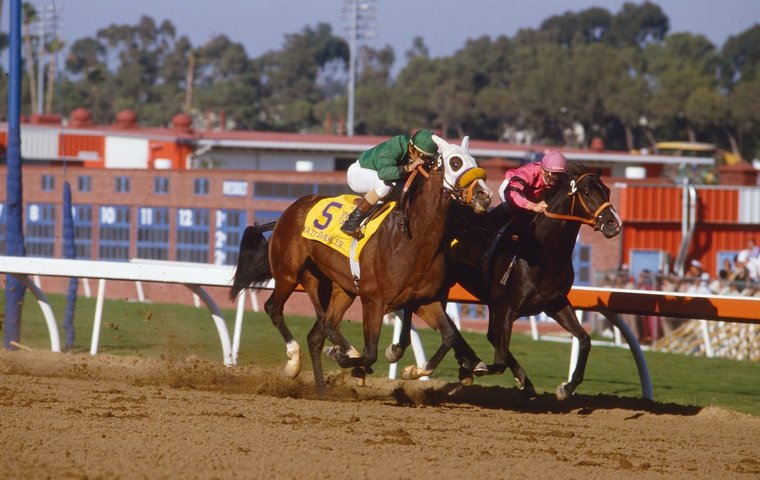
In an evocative piece, veteran LA racing writer Bill Christine recalls how Wild Again won the first edition of America’s richest race at Hollywood Park in 1984 – on the track and in the stewards’ room
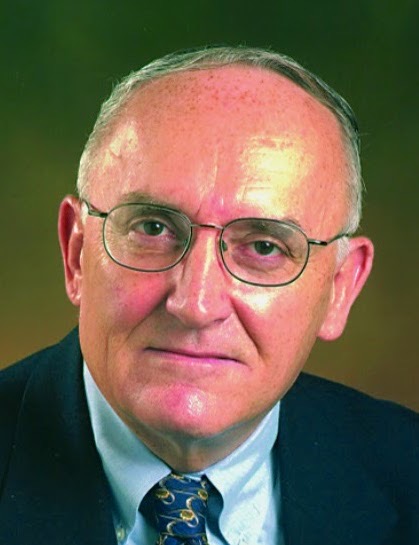 On the morning of the first Breeders’ Cup in 1984, Bill Allen’s future wife was in her hotel room, dressing up for the short trip to Hollywood Park.
On the morning of the first Breeders’ Cup in 1984, Bill Allen’s future wife was in her hotel room, dressing up for the short trip to Hollywood Park.
“What do you think?” Nina, the future Mrs. Bill Allen, said as she stood before him.
“You look terrific,” Allen said, “but there’s one thing.”
Nina couldn’t imagine what that might be. “It’s the wrong purse,” Allen said.
“It’s new,” Nina said. “I love it. Are you sure?”
“The color’s right,” Allen said. “But it’s the wrong size. It’s too small. It’s too small for all the money we’re going to carry out of there today.”
They erupted in a big laugh, but Allen was kidding on the square. His you-know-what were made out of brass.
So were those that belonged to Ron Volkman and Terry Beall, who rounded out the roster of owners who raced Wild Again, a four-year-old, near-black colt with ouchy legs, an aversion to the whip, an inconsistent record and, at a late hour, missing a jockey for the $3 million Breeders’ Cup Classic, the richest race, pro tem, on the planet. (Allen owned 58% of Wild Again, Volkman 25% and Beall 17%).
In his previous race, at the end of August, Wild Again was lackluster. The racing secretary at Bay Meadows had written the event purposely to accommodate Wild Again’s Cajun trainer, Vincent Timphony.
Disappointing third
Wild Again, hoping to shake a gnawing slump, finished a close but disappointing third, at 50 cents on the dollar, against some opponents who were hardly the quill.
Russell Baze, the crème de la crème of Bay Meadows jockeys, tried to whip Wild Again into contention, but the colt sulked, just as Timphony had warned. Timphony told Bill Allen and company that he wouldn’t make the mistake of hiring Baze again.
Nevertheless, the $3m Breeders’ Cup – winner’s share $1.35m – loomed on November 10. In the field would be Slew o’ Gold, undefeated in 1984 and the favorite for Horse of the Year honors; Gate Dancer, winner of the Preakness; Precisionist, a quality colt still on the come, but whose front-running style might compromise Wild Again; and Desert Wine, whose affection for Hollywood Park included a win in the Hollywood Gold Cup.
Great racetracks we have lost: Hollywood Park and the dawning of the Breeders’ Cup era
There were only seven horses for Wild Again to outrun, but as Spencer Tracy said in the movie, they were cherce.
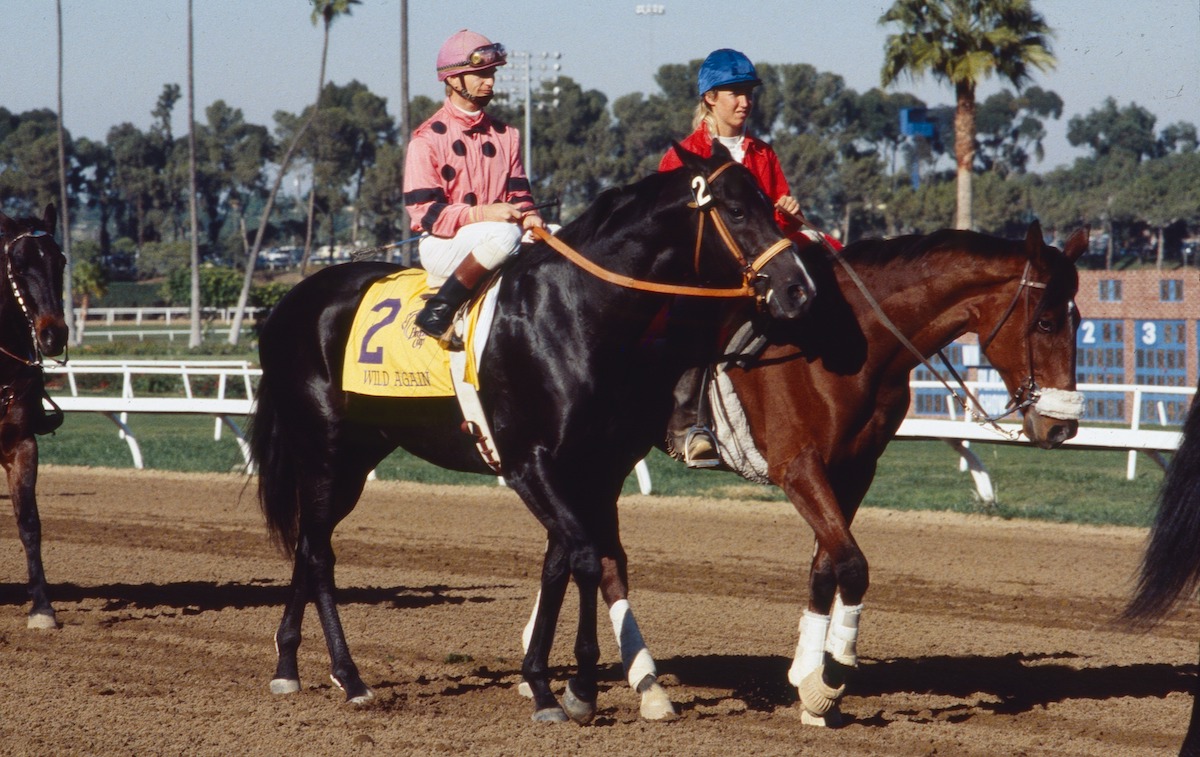 Eddie Maple had been penciled in to ride Wild Again, but at the post-position draw three days before the race, Timphony learned that Maple was switching to Track Barron, a horse who was also switched, from the Breeders’ Cup Sprint to the Classic.
Eddie Maple had been penciled in to ride Wild Again, but at the post-position draw three days before the race, Timphony learned that Maple was switching to Track Barron, a horse who was also switched, from the Breeders’ Cup Sprint to the Classic.
It was embarrassing; the overnight sheet, which listed the horses and riders for all the races, came out with ‘no rider’ next to Wild Again’s name.
A good fit
A frantic Timphony found and hired Pat Day, who had won with Wild Again before. Day was a good fit – he didn’t think you needed to thrash a horse to coax him.
Wild Again’s owners called themselves the Black Chip Stable, a black chip the equivalent of $100 at casinos. Their nut of $360,000 going into the Classic was enormous – it was the penalty required because they hadn’t nominated their horse when he was younger.
Black Chip Stable was a wild-and-crazy lot. Timphony, who owned an Italian restaurant in New Orleans, and his owners liked to party. After one riotous evening that stretched to dawn, somebody woke up at noon and said: “Hey, let’s get wild again.”
“Hey,” somebody else said, “that would make a pretty good name for a horse.”
I ran into Mickey Taylor at the barns after the draw. He was one of the partners who campaigned Seattle Slew, the 1977 Triple Crown champion, and now they were cruising for more glory with one of Slew’s sons, Slew o’ Gold.
“How about Wild Again?” I said.
“Putting up $360,000, just to run?” Taylor said. “Brother, that’s what’s known as being dead game.”
Years later, Allen said: “It wasn’t that much of a gamble, if you think about it. The guys who play this game at the highest level, we spend more than that at the sales on a single horse all the time.
‘We knew what we were risking’
“And at a sale you’re getting an unproven horse who’s never run,” he went on. “With Wild Again, it was a lot of money, but we knew what we were risking and we knew we had a very good horse.”
While Pat Day was happy to back into a mount in the richest race, years later he reflected and said: “I’ll be honest, I thought he was up against it. I thought they were silly.”
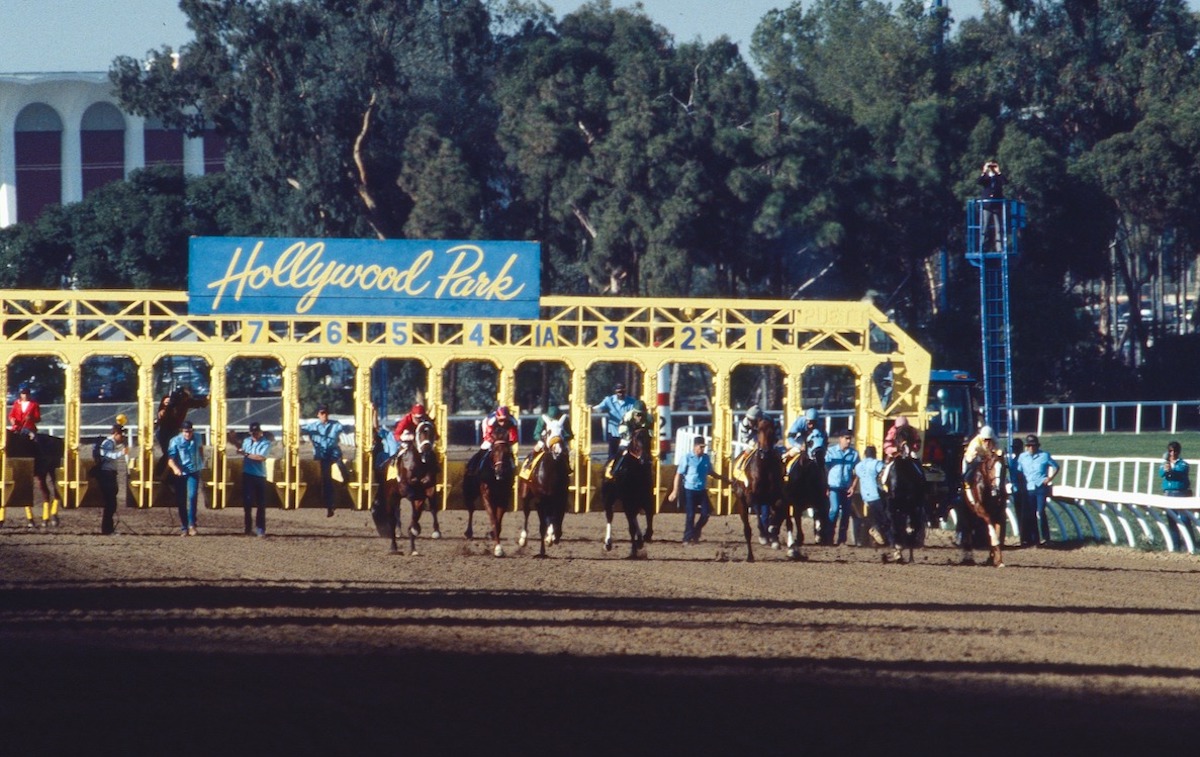 The crowd of 64,254 was chockablock with celebrities, including Gerald Ford, Elizabeth Taylor, Cary Grant, Frank Sinatra, Gregory Peck and Jack Klugman.
The crowd of 64,254 was chockablock with celebrities, including Gerald Ford, Elizabeth Taylor, Cary Grant, Frank Sinatra, Gregory Peck and Jack Klugman.
At post time for the mile-and-a-quarter Classic, Wild Again was a realistic 31-1, second longest price. After all, it looked as though Wild Again had practically forgotten how to win – he had been beaten in seven of his previous eight races.
Slew o’ Gold was coupled in the betting with an entrymate, the ill-fitted Mugatea, who had won six of 31 starts in 1983-84 and had seldom been tested beyond seven furlongs. In the vernacular of the racetrack, Mugatea would be a ‘rabbit’, a speed horse entered in a race to soften up the other speed horses. In this case, Mugatea was supposed to compromise Precisionist and Wild Again, and allow Slew o’ Gold to win from off the pace.
Even without the two-horses-for-the-price-of-one factor, Slew o’ Gold would have gone off odds-on at 3-5. Reports that he had foot concerns apparently went unheeded by the bettors who mattered. The money poured in.
The outclassed Mugatea was cooked by the first turn. The quick early pace was left to Wild Again and Precisionist.
Wild Again, breaking from the No. 2 post, outside only Mugatea, led almost all the way. Precisionist was his only company as they sped down the backstretch. Slew o’ Gold, Angel Cordero up, was a distant fifth and Gate Dancer, the second betting choice at 7-2, was even farther back.
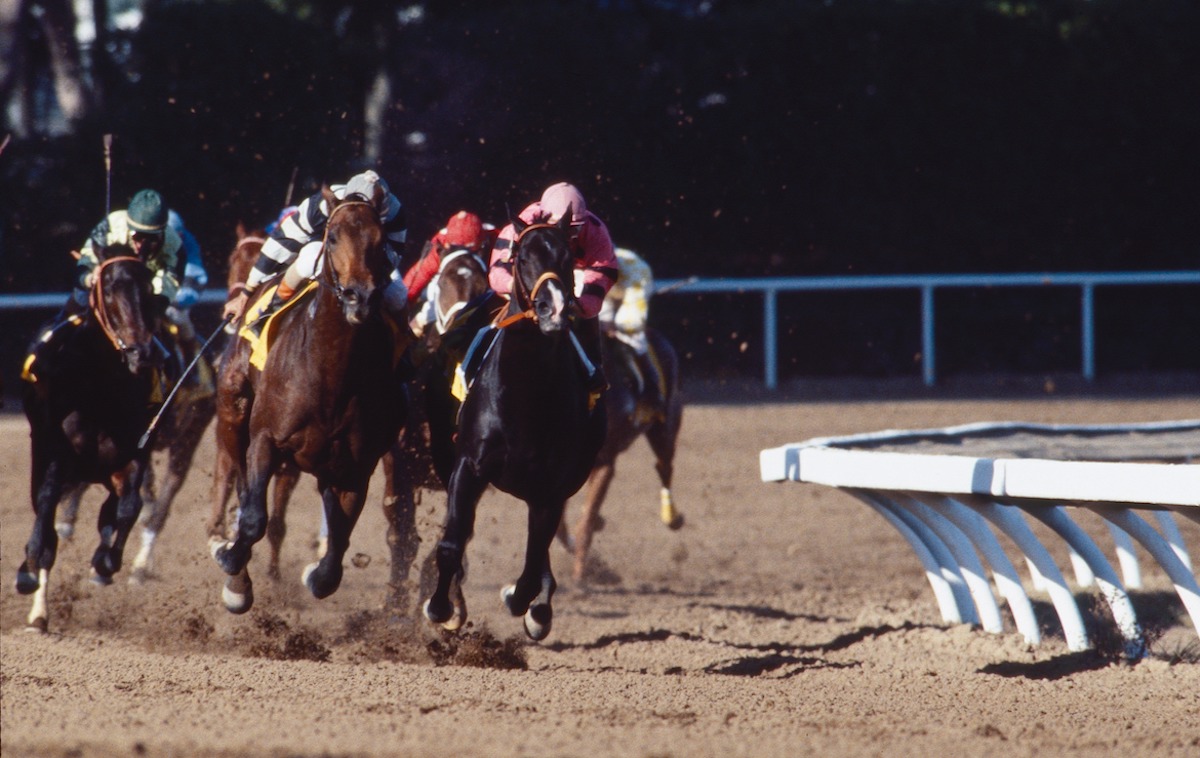 By the far turn, Precisionist weakened, and as they neared the quarter pole, Wild Again and Slew o’ Gold were virtually head and head, and had the late-running Gate Dancer to worry about.
By the far turn, Precisionist weakened, and as they neared the quarter pole, Wild Again and Slew o’ Gold were virtually head and head, and had the late-running Gate Dancer to worry about.
Impossible to miss
Gate Dancer was impossible to miss. Jack Van Berg, the colt’s trainer, theorized that crowd noise had been his undoing, so he fitted him with garish white earmuffs that pointed toward the sky. The wags were saying that Halloween was over.
Laffit Pincay had Gate Dancer gobbling up ground in the middle of the track. At the head of the long stretch, Day went to his whip and gave Wild Again a light tap from the right side. Still cognizant of Timphony’s no-whip orders, he knew Wild Again sometimes liked to lean out and he wanted to make sure he ran a straight line to the wire.
Closing with gusto, Gate Dancer was lugging in, toward Slew o’ Gold on his inside. He was pulling the same antics that got him demoted from fourth to fifth place in the Kentucky Derby.
Usually, the rougher the finish, the more Cordero liked it. He thrived riding the other guy’s horse in a tight finish. But now he was like the white stuff in an Oreo cookie.
A head in front
Gate Dancer was slamming him from the outside and he was repeatedly brushing Wild Again, who was not giving an inch on his left. Cordero was forced to finish without using his whip. There was no room for him to lift his whip hand.
Wild Again was a head in front when they hit the wire, and Gate Dancer, finishing second, had a half-length on Slew o’ Gold.
I couldn’t think of three more qualified stewards to play God. I’ve always said that there ought to be at least one ex-jockey in every team of stewards, and Hollywood Park had two – Alfred Shelhamer and Hubert Jones.
They had been average riders – although Jones had once won eight races in one afternoon at Agua Caliente – but forged creditable careers and become respected stewards. The third steward in the stand, Pete Pedersen, had worked most every job on the front side of racetracks, and for a spell even wrote eloquently about the sport.
Ten minutes went by, seeming like eternity. The stewards delivered half a loaf, disqualifying Gate Dancer from second to third, a difference of $351,000 in purse money. Wild Again was held blameless and Slew o’ Gold was moved up to second place.
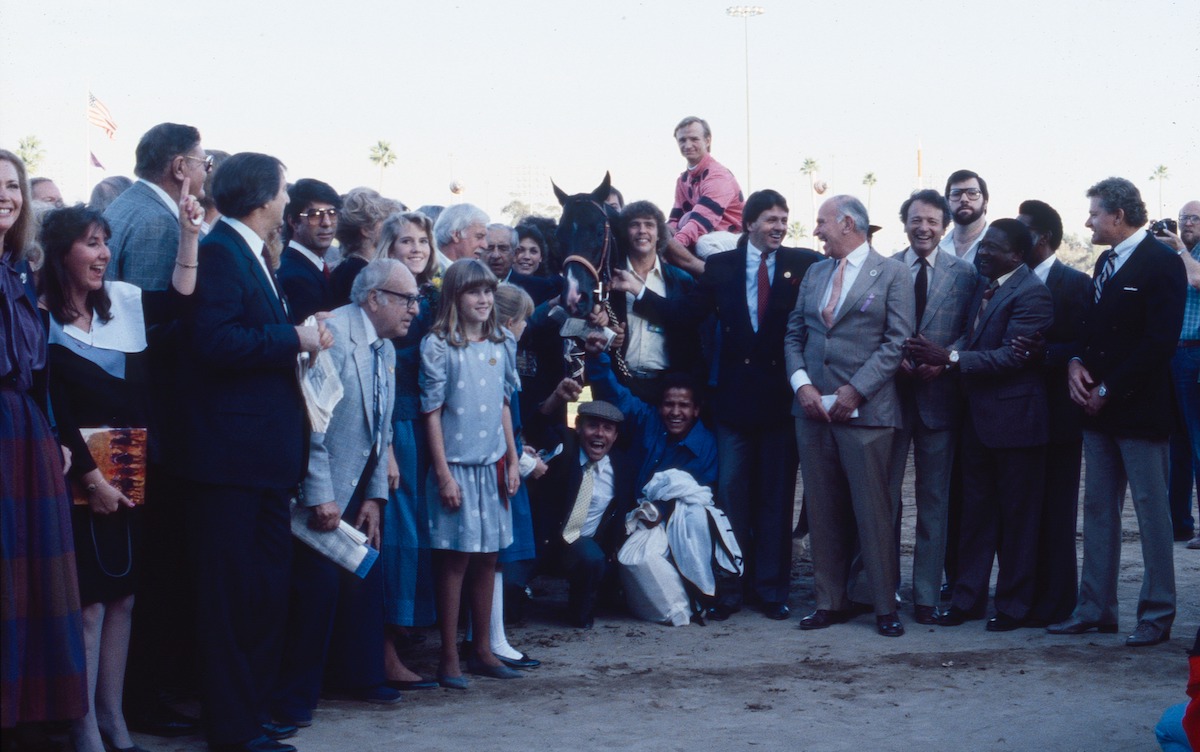 At a hospital in Rancho Mirage, the nurses were jumping up and down as they watched NBC’s telecast of the stretch run. Terry Beall, one of Wild Again’s owners, had undergone quadruple bypass surgery the day before.
At a hospital in Rancho Mirage, the nurses were jumping up and down as they watched NBC’s telecast of the stretch run. Terry Beall, one of Wild Again’s owners, had undergone quadruple bypass surgery the day before.
One of the nurses drove over to Nevada to place a $20 across-the-board bet on Wild Again (when he paid $64.60, 10.80 and $3.60, her return totaled $790). A $5 exacta with Wild Again and the moved-up Slew o’ Gold paid $514.50.
Ron Volkman, one of Wild Again’s owners, told me years later that he and his two partners collected more with bets than they did from the seven-figure purse. Much of their bonanza was from bets in Las Vegas, where wagers were not yet commingled with track pools and thus didn’t affect track odds.
Volkman was in charge of the bets at Hollywood Park. He insisted on a lump payment. Using a men’s room stall as a makeshift counting house, the nervous Volkman almost dropped some of the cash into the toilet.
I made my way from the press box to the stewards’ booth. Alfred Shelhamer, sitting with me one on one, was about to share things that other reporters wouldn’t have.
‘Shelly’ – no one called him Alfred – re-ran, in slow motion, the head-on video of the stretch run of the Classic. He told me to pay attention to the harrow marks, the lines a tractor makes in grooming the surface of the track.
Virtual straight line
He stopped the head-on, then ran it again, then stopped it once more. Wild Again was inside the harrow, never crossing it. That showed the stewards, Shelhamer said, how the colt ran a virtual straight line all the way to the finish line.
The contact between Wild Again and Slew o’ Gold – a brush, at most – was the result of Gate Dancer lugging into Slew o’ Gold, forcing him in the direction of the rail.
“Because of the harrow,” Shelhamer said, “we were able to come to the decision we did.”
Bill Hartack was the unsung star of a hearing the next morning. A five-time winner of the Kentucky Derby, the ex-jockey was a patrol judge on Breeders’ Cup day. Because Hartack was an expert at analyzing race film, the stewards turned him loose the next day and in effect he ran the meeting.
“Wild Again varied only about this much,” Hartack said, as he held his hands about six inches apart. “It would have been a miscarriage of justice to take his number down.”
The connections of Slew o’ Gold and Gate Dancer, while not happy, chose not to protest.
The nine-year-old John Henry, who missed running in the Breeders’ Cup Turf because of injury, outvoted Slew o’ Gold for his second Horse of the Year title. Wild Again ran in 1985, but never won another race.
There was a bitter disagreement between Bill Allen and Vincent Timphony, Wild Again’s trainer, regarding Timphony’s share of the horse’s breeding rights. When Allen died in 2008, Timphony called his ex-wife, Scarlett Booth Timphony, and said: “I won. Allen died first.”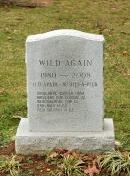
When Timphony died, at 76, in 2010, he was out of racing and practically destitute.
The announcement that John Henry won Horse of the Year backfired on me in the worst way. Those of us at the Los Angeles Times knew that the announcement, at a black-tie dinner in Beverly Hills, would come late at night, close to our last deadline.
So early in the day, I wrote two stories, one with John Henry winning and the other with Slew o’ Gold being voted champion.
After the announcement at the dinner, I rushed to a phone and told the desk to use the John Henry story. Somehow, however, the wrong story got in the paper and according to the Los Angeles Times, Slew o’ Gold was Horse of the Year.
Sam Rubin and his wife Dorothy owned John Henry. About a week later, I sent Sam the Slew o’ Gold tear sheet with a note that said: “You really thought you won, didn’t you?”
• Bill Christine covered the 1984 Breeders’ Cup for the Los Angeles Times, where he was a staff writer for 25 years and shared in a Pulitzer Prize in 1994. Author of a biography about the Hall of Fame jockey Bill Hartack, Christine’s current projects include a true-crime book and a novel
• Visit the Breeders' Cup website
‘Sincerity was his middle name’ – Bill Christine remembers the late David Hofmans
The big Breeders’ Cup question: can City Of Troy win the Classic on the dirt?
A life after racing: Meydan hero Extravagant Kid helps guide horses through retraining
View the latest TRC Global Rankings for horses / jockeys / trainers / sires


